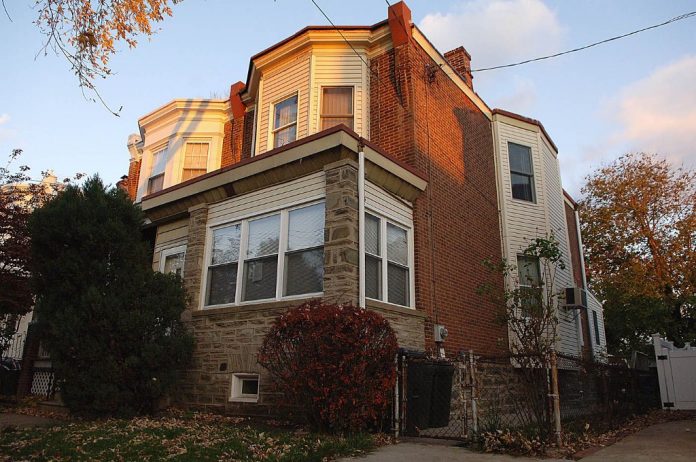Debbie Merrigan and her husband, Gary, had some financial difficulties in fall 2009. They moved out of their house on the 7300 block of Bingham St. because they thought it was going to be subject to a sheriff’s sale.
“We turned in the keys,” Gary Merrigan said Monday.
He said more was owed on the Burholme house than it was worth, and he expected the property would be sold. A couple months ago, when Merrigan saw Kevin Brame moving in, he thought that, at long last, it had indeed been sold.
Then the Merrigans got a surprise. A friend checked property records online, Gary Merrigan said, and they found out that the building had never been sold and that it remained in their name.
The city’s online property records still list Debbie and Gary Merrigan as the owners. Debbie has a deed. She now believes she soon will have the money to clear up what is owed on the house.
She wanted to take possession of the property, but Brame was living there.
On Monday, Brame explained that he didn’t have a place to stay a few months ago and a friend introduced him to a man named Maurice who he said rented the house to him for $400 a month.
“It was desperation,” Brame said Monday.
He said he isn’t sure of Maurice’s last name or how to get in touch with him.
On Halloween, Debbie Merrigan called police to have Brame removed from the premises, but legally, the police are not able to just toss out the man she called a squatter, she said she was told.
“It’s an unusual situation,” said Mark Mroz, the 2nd Police District’s community relations officer.
Ordinarily, he said, police can remove squatters from a house, but the utilities were on and Brame had a key. He’s also no stranger to the neighborhood. Brame’s mother, Barbara, lives right across the street. Brame’s driver’s license lists her address.
“Unfortunately, squatters have rights,” said Sheriff Barbara Deeley. “We’re willing to remove him, but we need a court order.”
She explained to Merrigan what she had to do to legally evict the man — how long it would take and how much it would cost.
Merrigan said had she started the process Deeley’s office spelled out for her, which could take weeks and cost her several hundred dollars.
Merrigan said she sent a letter to Brame in which she told him he had to be out by Monday. She said she filed a complaint with the Philadelphia prothonotary office.
However, the Merrigans quietly took matters into their own hands, she said in a phone interview on Monday morning. She said they had entered the house via a side window, and when she spoke to a reporter a little after 10 a.m., her husband was at a hardware store buying new locks for the property.
She said no one was in the building when she and her husband got in.
Mroz said police last week had warned Brame he had to leave by Monday. Brame, interviewed while he was moving his possessions early Monday afternoon, said he had believed he was legally in the building, but knows he had been victimized.
He said the utilities were on when he moved in.
PECO spokesman Ben Armstrong said the utility’s workers, responding to a complaint, found an illegal service connection and severed it Nov. 8.
Mroz said he talked to Brame on Monday and told him he didn’t have a legal right to be in the Merrigans’ house.
“I told him you just can’t come in and say this is your property,” Mroz said.
Mroz said police can’t always just force people out, and they’re wary of doing that anyway, because landlords sometimes make up stories to get their tenants out.
The Merrigans’ case is not the only one involving properties being inhabited by people who have no right to be in them. The sheriff said her deputies remove between five and 10 such people a year.
It happens all over the city, said Deeley, who lives in Rhawnhurst. “You just don’t see it very much in the Northeast.”
If the Merrigans had been unable to get into the house, they would have proceeded with the complaint they had filed with the prothonotary, and if there had been no response, a judgment would have been filed in default and then a writ of possession would have been issued for the Merrigans. Then, the sheriff’s office would have contacted Brame to tell him he had to move out.
That’s what’s done in all such cases, Deeley said.
“We’re polite with them, but we let them know we are going to evict them,” Deeley said.
In what is called “house stealing,” some people who have taken up residence in homes that are owned by others really think they are on the premises legitimately.
It’s more complicated than just moving in, prosecutors have been saying for the past few years. Typically, the real owners don’t know anyone is on their properties. The people who are there might have been provided phony deeds or leases. When the real owners find out they have uninvited company, they have to go through the process of establishing their ownership to get the people evicted if they don’t leave on their own.
What happened to the Merrigans and Brame follows the scenario. Brame said he paid rent to the man named Maurice, who he believed owned the property. He said he now has nowhere to stay and he’s out $800. ••
Reporter John Loftus can be reached at 215–354–3110 or [email protected]





